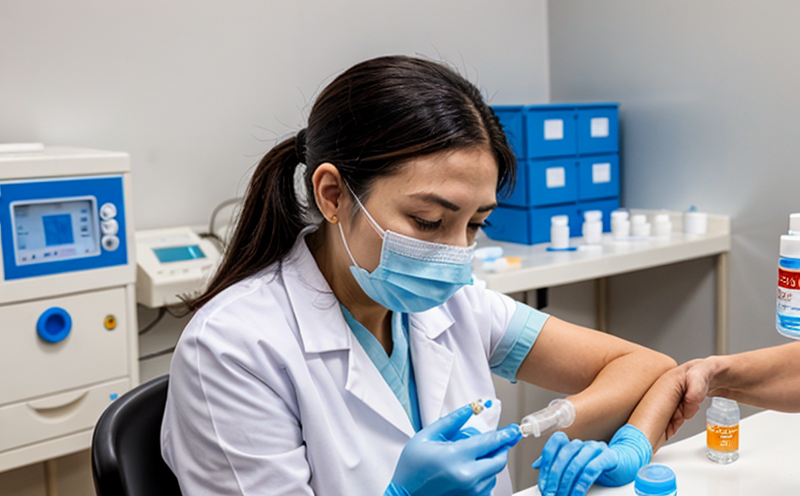JP Preservative Content Testing of Vaccines
The Japan Pharmacopoeia (JP) is a widely recognized pharmacopeial standard that sets forth criteria for the quality, purity, and potency of pharmaceutical products. Among its stringent guidelines are specific requirements regarding preservatives in vaccines to ensure public health safety and efficacy. The testing of preservative content plays an essential role in maintaining the integrity and stability of vaccine formulations.
The most commonly used preservatives in vaccines include thiomersal (ethylmercury thiocyanate), phenol, and benzyl alcohol. These preservatives serve to inhibit microbial growth and extend shelf life without compromising vaccine potency or safety. However, their presence must be accurately quantified according to the standards set by regulatory bodies like the JP.
The process of testing for preservatives in vaccines involves several critical steps, including sample preparation, analysis using appropriate techniques such as High-Performance Liquid Chromatography (HPLC) with UV detection, and adherence to strict quality control measures. Compliance with these procedures ensures reliable results that meet regulatory requirements.
At Eurolab, we employ advanced analytical methodologies and state-of-the-art equipment tailored specifically for JP-preservative content testing of vaccines. Our team uses cutting-edge HPLC systems capable of detecting even trace amounts of preservatives, ensuring precision and accuracy in our analyses. By adhering strictly to the specified methods outlined in the Japan Pharmacopoeia, we guarantee results that are both reproducible and compliant.
The importance of accurate preservative content testing cannot be overstated. Inadequate levels can lead to insufficient protection against contaminants, while excesses may cause adverse reactions or reduced vaccine effectiveness. Therefore, rigorous adherence to established protocols is crucial for maintaining product quality and patient safety.
Our laboratories are equipped with experienced professionals who possess extensive knowledge of pharmaceutical regulations and best practices. They ensure that every aspect of the testing process adheres meticulously to the requirements specified in the Japan Pharmacopoeia. This includes not only executing precise analytical techniques but also interpreting data correctly and communicating findings clearly.
In summary, JP-preservative content testing of vaccines is a vital component of ensuring vaccine quality and safety. By leveraging our expertise and state-of-the-art facilities, Eurolab provides reliable results that meet stringent regulatory standards.
Eurolab Advantages
- Accurate & Reliable Results: Our laboratories utilize advanced analytical methodologies and cutting-edge equipment to ensure precise measurements of preservative content in vaccines.
- Compliance with Standards: We strictly adhere to the requirements set forth by the Japan Pharmacopoeia, ensuring that our results are both reproducible and compliant.
- Expertise & Experience: Our team comprises highly skilled professionals who possess extensive knowledge of pharmaceutical regulations and best practices.
- State-of-the-Art Facilities: Equipped with the latest technology, our laboratories offer an environment conducive to producing accurate and consistent results.
These advantages combined ensure that clients receive reliable data they can trust when it comes to JP-preservative content testing of vaccines. Our commitment to excellence guarantees peace of mind for those responsible for maintaining high standards in pharmaceutical manufacturing processes.
Environmental and Sustainability Contributions
In addition to providing accurate preservative content testing services, Eurolab also makes significant contributions towards environmental sustainability. By ensuring that vaccines meet the stringent quality criteria outlined by regulatory bodies like the Japan Pharmacopoeia, we help reduce waste associated with substandard products. This not only protects public health but also minimizes the impact on healthcare systems worldwide.
Moreover, our commitment to accuracy and reliability supports research and development efforts aimed at creating more effective vaccines with longer shelf lives. Such advancements contribute positively to global health initiatives by reducing the need for frequent re-administration of treatments due to spoilage or degradation issues.
The precise nature of our testing services also helps prevent unnecessary production runs caused by non-compliance, thus conserving resources and minimizing energy consumption during manufacturing processes. By supporting these efforts, we play a crucial role in promoting sustainable practices within the pharmaceutical industry.
Use Cases and Application Examples
- Vaccine Quality Assurance: Ensuring that vaccines meet the high standards set forth by regulatory bodies like the Japan Pharmacopoeia is critical for maintaining public trust. Regular testing of preservative content helps verify compliance with these stringent guidelines.
- R&D Support: Accurate measurement of preservative levels provides valuable data during vaccine development, helping researchers optimize formulations and improve efficacy.
- Supply Chain Management: Continuous monitoring ensures that vaccines remain stable throughout transportation and storage, minimizing the risk of contamination or degradation.
- Patient Safety: By confirming adherence to prescribed preservative concentrations, these tests contribute significantly to patient safety by preventing potential side effects from improper levels.
In conclusion, JP-preservative content testing is an indispensable part of ensuring vaccine quality and safety. Through our commitment to accuracy, reliability, and compliance with international standards such as the Japan Pharmacopoeia, Eurolab plays a pivotal role in supporting these vital objectives.





